SWEDISH
SOUTH ASIAN STUDIES NETWORK
SASNET Work Report 1 January – 31 December 2006: |
Swedish South Asian Studies Network, Lund University – Administrative Report No. 7 |
Lund 12 April 2007
By Staffan Lindberg, director/coordinator & Lars Eklund, webmaster/deputy director
2.1 SASNET’s board
2.2 Driving force
2.3 Gateway
2.4 Plans for 2007
3.1 Interacting with students, researchers and teachers
3.2 Newsletters
3.3 Planning and networking grants 2006
3.4 Courses and institution building
3.5 Working with Ph.D. students and supervisors
3.6 Media
3.7 Root node public activities
3.8 Interaction with state agencies
3.9 Interaction with ambassadors
4. Chronology of Minor Activities 2006
5. SASNET Lund activities 2006
6. Enclosures delivered along with the printed work report (as pdf-files):
Appendix 1: Report from the workshop on the "Role of South Asia in the Internationalisation of Higher Education in Sweden” held at Nobel Forum, Karolinska Institutet in Stockholm 28-29 November 2006
Appendix 2: Budget for 2006
Appendix 3: Utfallsrapport för jan – dec 2006
Appendix 4: Budget for 2007
Appendix 5: Minutes from SASNET’s Board meeting, August 30, 2005
Appendix 6: Minutes from SASNET’s Board meeting, February 14, 2006
Appendix 7: Minutes from SASNET’s Board meeting, August 29, 2006
Appendix 8: Minutes from SASNET’s Board meeting, January 29, 2007
1. Introduction and summary
During 2006 we continued to network with old and new partners in order to sustain already established activities and to start new ones. The work follows the original plan drawn up for SASNET in October 2000 and subsequent plans made by the various board meetings. The board meetings on 30 August 2005 and on 16 February 2006 gave more precise directions.
During 2006 SASNET’s work concentrated on the following major tasks:
• Report on and follow up of the contact journey to the north-eastern parts of South Asia in November – December 2005
• The planning and realization of a workshop on the "Role of South Asia in the Internationalisation of Higher Education in Sweden" at Nobel Forum, Karolinska Institutet in Stockholm 28-29 November 2006
• Recruiting a new board and a new director for the period 2007 to 2009
Besides this we continued with the usual routine activities:
• Further development of SASNET’s Internet Gateway,
providing extensive information about South Asia related research and
education at Swedish universities.
• Funding and supporting the
planning of new research and education networking projects across Sweden,
including guest lecture programmes and interdisciplinary workshop grants.
16 projects were funded in 2006.
• Interaction and meetings with
network partners at universities all over Sweden and in the other Nordic
countries.
• Interaction over the Internet and via telephone with
a large number of Swedish and South Asian students and scholars, providing
information and contacts
• Interaction with Sida’s Asia division
and other relevant authorities in Stockholm.
• Interaction with
the South Asian embassies in Sweden (Bangladesh, India, Pakistan and
Sri Lanka) about various issues.
• Organisation of lectures, seminars
and cultural activities at Lund University
• Further attempts
to organise a Nordic Research School for South Asia, called SARTrain
• Continued
support to the Masters Programme in Asian Studies at Lund University,
in collaboration with the Centre for East and South-East Asian studies.
• Continued
organisation of an undergraduate programme in South Asian Studies at Österlen’s
Folk High School
Our expenses were according to the budget approved by the board on 14 February 2006 with a net surplus of SEK 85 000 (see Appendices 2 and 3).
2. Organisation
During 2006, the board held two meetings.
Decisions taken at the board meeting on 14 February guided most of the activities of SASNET during 2006 (see point 4). For the Minutes, see Appendix 6.
29 August board meeting. For the Minutes, see Appendix 7.
During the 29 August meeting the position as new director for SASNET was up for suggestion to the Vice-Chancellor of Lund University. The board suggested Anna Lindberg, Penn State University, USA, and the Department of History, Lund University. In December the Vice-Chancellor decided to appoint her from 1 July 2007 to 31 December 2009. Staffan Lindberg’s appointment as Director was extended for the period 1 January to 30 June 2007.
During the summer and autumn of 2007 a committee consisting of Bo Lindblad, Malin Åkerblom and Staffan Lindberg prepared a list of name for the new board of SASNET from 2007 – 2009, which was approved by Lund University Vice-Chancellor in November 2006. For information about the new board members, see http://www.sasnet.lu.se/organisation.html.
Staffan Lindberg worked as Director and Coordinator (50 %) Besides work at the root node, which is included in this general report, his individual activities related to South Asian studies are reported in Section 4 below.
Lars Eklund worked as full-time Webmaster and Deputy Director. Besides work at the root node, which is included in the general report, his individual activities related to South Asian studies are reported in Section 4 below.
Boel Billgren, deputy head of the International Office coordinated the organisational efforts on behalf of SASNET. A number of other persons, including Mr. Lars Magnusson, and Ms. Birgitta Hansson at the International Office generously assisted SASNET with their services of administration. Karin Andersson at the Office of Analyses and Projects was also very helpful in managing our payments and accounts.
SASNET also received support from the Department of Sociology (providing free office space for Staffan Lindberg, allowing us to use their lecture halls and conference rooms, and helping with photocopying, etc.).
The Internet Gateway is now established as a reliable and thorough source of information for students, researchers and other persons interested in South Asian studies. It has received worldwide attention and recognition for its wealth of useful information. Currently we have about 2 700 visitors per month. Since this is SASNET's main tool of communication a lot of time is spent updating and developing its content. New information is added on a daily basis, and the work is done on a journalistic basis.
On 29 January 2007 the new board set the agenda for SASNET’s new activities in 2007 (see Appendix 8 , Minutes from the 29 January 2007 meeting).
The board decided that the priority keyword for 2007 should be consolidation to strengthen SASNET’s network in Sweden. The board also approved that a contact journey to India should be carried out in the Fall, 2007. The main priority for the tour should be to meet people and make SASNET known, but it should also be a strategically planned journey, pointing to selected universities and core institutions in the region.
Otherwise, the work will be concentrated on the transfer of the directorship. Staffan Lindberg will use part of his remaining work time during the second half of 2007 to introduce Anna Lindberg into the work.
Anna Lindberg and Lars Eklund will visit as many of SASNET’s partners in Göteborg, Karlstad, Stockholm, Uppsala and other places as possible during the autumn. Besides getting to know the various environments and partners, the meetings can focus on problems in the various Masters programmes offered at the universities, and that recruit students from South Asia. Visits should also be made to Sida’s Asia Division, Sida SAREC, the South Asia division at the Ministry of Foreign Affairs, Ministry of Education, etc.
During the contact journey to India scheduled for November, Lindberg and Eklund will visit universities and research institutions in the Delhi, Ahmedabad, Mumbai, Pune and Bangalore regions of India (not covered by previous contact journeys). They will also arrange a workshop with SASNET’s South Asia Reference Group on the theme: 'How to network in South Asian Studies?'
During the spring of 2007, Staffan Lindberg and Lars Eklund have visited Blekinge Institute of Technology and Kalmar University. Staffan has participated in an Oslo University seminar on India, an EU Forum in Hässleholm and in a TV programme on modern Indian history (Kunskapskanalen, 6 May 2007). An India Business day will be organised with the Sweden India Business Council at Ideon in Lund on 23 May 2007. We are planning a two days India Seminar during the fall with Roskilde University in Denmark, and a one day India Seminar at Lund University.
Besides this, the board suggests that the root node with partners become more active in publishing articles of general interest as well as news about new publications, etc. in the Gateway.
The visits to Indian universities during the contact journey in November 2007 should also be followed up during the Spring 2008 with networking in the Nordic countries and with European partner institutions.
Suggested important additional tasks for 2008 includes to plan for and partly finance an interdisciplinary workshop about Environment in South Asia, co-organised with Uppsala University (Gunnel Cederlöf).
3. Networking Activities
3.1 Interacting with students, researchers and teachers
During 2006 we interacted with a large number of researchers, teachers and students by the exchanging e-mails and telephone calls. Many of these contacts were generated through our organisation of the 18th European Conference of Modern South Asian Studies in 2004, our contact journey to South Asia in 2005 and our participation in the 19th European Conference of Modern South Asian Studies in Leiden in 2006 . In all these contacts we used our Internet Gateway as a source of information. Some of the more important activities are listed in Section 4 below below.
The most important activity in 2006 was that SASNET successfully held a workshop on the "Role of South Asia in the Internationalisation of Higher Education in Sweden" at Nobel Forum, Karolinska Institutet in Stockholm 28-29 November 2006. It was jointly organised by SASNET, Karolinska Institutet Medical University and the Swedish Institute, and involved sessions with representatives from 20 Swedish universities, and from the International Programme Office for Education and Training; the Swedish National Agency for Higher Education; STINT; the Government ministries of Education and Foreign Affairs; and the South Asian embassies in Stockholm. There were altogether about 80 participants.
The focus
was on experiences from masters and PhD programmes in Sweden as well
as in South Asia, with an aim to promote increased academic exchange
with South Asia. Most of the workshop presentations are now available
on our web site as pdf-files. They include Mr. Sunandan Roy Chowdhury’s
provocative keynote presentation, titled ”The Moffusil and the
Metropolitan – Higher Education’s Meandering Paths”.
In addition to this, Jan Magnusson (a key person behind the creation
of SASNET seven years ago and now a member of SASNET’s board) has
written a report, summarizing the two-day workshop sessions. Read
the workshop report.
For full information about the workshop, see
Appendix 1.
SASNET distributes newsletters and updates the Internet Gateway on a daily basis. The distribution list presently contains about 1 300 e-mail addresses.
Dates for the publication of the newsletters during 2006 were:
• Newsletter 58. January, 23, 2006
• Newsletter 59. March, 9, 2006
• Newsletter 60. April, 7, 2006
• Newsletter 61. April, 28, 2006
• Newsletter 62. May, 24, 2006
• Newsletter 63. June, 20, 2006
• Newsletter 64. August, 25, 2006
• Newsletter 65. September, 20, 2006
• Newsletter 66. October, 17, 2006
• Newsletter 67. November, 9, 2006
• Newsletter 68. December, 11, 2006
All the newsletters can be found at: http://www.sasnet.lu.se/sasnet.html. They represent a detailed archive of all major activities in SASNET during the year with links to relevant documents and homepages.
3.3 Planning and Networking Grants 2006
The reference group, consisting of Prof. Pamela Price (Department of History, Oslo University), Dr. Neil Webster (Centre for Development Research, Copenhagen), and Dr. Malin Åkerblom (International Science Programme, Uppsala), decided to approve grants to the following persons, projects and programmes (http://www.sasnet.lu.se/grants.html):
Decisions made on 29 January 2006
A total number of 19 applications for SASNET planning grants were received. Total amount applied for was 1.61 Million SEK.
Planning grants for research programmes/projects:
• Pernille Gooch, Division of Human Ecology, Lund University: ”Mangrove conservation as a sustainable life insurance for coastal Tamil Nadu communities.” SEK 45 000.
• Marc Katz, Dept. of Religious Studies, Karlstad University: ”The Vitality and Role of ‘Sporting Clubs’ in the Multi-Cultural Community: A Study of the Traditional Youth Organizations of Banaras.” SEK 50 000.
• Madelene Ostwald, Physical Geography, Earth Sciences Centre, Göteborg University: ”Climate Change and Climate Collaboration between Peradeniya and Göteborg University. The Potential of using CDM in land and vegetation recovery after the 2004 tsunami in southern Sri Lanka.” SEK 50 000.
• Sten Widmalm, Dept. of Government, Uppsala University: ”Tolerance in Challenging Political Environments in Uganda, Kenya, India and Pakistan.” SEK 50 000.
Planning grants for educational programmes/projects:
• Anders Björkman, Malaria Research Unit, Dept. of Medicine, Karolinska Institutet Medical University, Stockholm: ”Rational use of antimalarial drugs in Pakistan.” SEK 60 000.
• Jim Walch, Dept. of Curriculum Studies and Communication (UKL), Stockholm Institute of Education: ”Teacher education in the field: Facilitating thesis work in South India.” SEK 50 000.
Decisions made on 29 August 2006
Two new grant programmes was launched implemented
• Interdisciplinary workshops
• Guest lecture programmeA total number of 17 applications for SASNET planning grants were received. Total amount applied for was 968 500 SEK.
Planning grants for continued research project:
• Marc Katz, Dept. of Religious Studies, Karlstad University: ”The Vitality and Role of ‘Sporting Clubs’ in the Multi-Cultural Community: A Study of the Traditional Youth Organizations of Banaras.” SEK 30 000.
Planning grants for new research projects:
• Magnus Holm, Dept. of Cell and Molecular Biology, Göteborg University: "Light regulated development in plants – Translational research in Rape-seed and Rice." SEK 45 000
• Ashok Kumar, Dept. of Biotechnology, Center for Chemistry and Chemical Engineering, Lund University: "Cost-efficient production of therapeutic proteins – a need for bioindustry in developing countries." SEK 55 000 SEK
Grants for Guest Lecture programmes:
• Göran Djurfeldt and Staffan Lindberg, Dept. of Sociology, Lund University: Invitation of Mr. R. Vidyasagar, Consortium for Interdisciplinary Water Resources Studies, Chennai, India. SEK 20 000
• Christina Grenholm, Center for Gender Studies, Karlstad University: Invitation of Anjoo Upadhyaya, Banaras Hindu University, Varanasi, India. SEK 20 000
• Sidsel Hansson, Centre for East and Southeast Asian Studies, Lund University: Invitation of Dr. Bidyut Mohanty, Women's Studies Department, Institute of Social Sciences, New Delhi, India. SEK 20 000
• Gunnar Jacks, Dept. Of Land and Water Resources Engineering, Royal Institute of Technology, Stockholm: Invitation of Dr. Alagappan Ramanathan, Dept. of Environmental Sciences, Jawaharlal Nehru University, New Delhi, India. SEK 20 000
• Bo Nordström, Dept. of Chemical Technology, School of Engineering, Jönköping University: Invitation of Jayant Mahadev Doke, Dept. of Environmental Sciences, University of Pune, India. SEK 20 000
Grants for organising an Interdisciplinary Workshop:
• Bo Lindblad, Division of International Health (IHCAR), Department of Public Health Sciences, Karolinska institutet, Stockholm: ”Micronutrient Supplementation to pregnant women in South Asia." SEK 150 000
• Lennart Strömquist, Applied Environmental Impact Assessment; Department of Social and Economic Geography, Uppsala University: "Participatory GIS; a tool for planning of rehabilitation of communities affected by natural disasters." SEK 78 000
3.4 Courses and institution building
The Masters Programme in Asian Studies at Lund University was started on 1 September 2003 at Centre for East and South-East Asian Studies (ACE). The South Asian studies’ track has had around 15 students in the programmes started in 2003, 2004, 2005 and 2006. SASNET root node has been active in the course with Staffan Lindberg teaching a 10 credit course on region specific development and supervising some of the students and with Lars Eklund providing information about sources for South Asia Studies as well as making the SASNET magazine library available to the students.
We continued to work with a one-year academic undergraduate course about India/South Asia at Österlen’s Folk High School (20 credit points). The teachers come from sociology, human ecology, and anthropology and the programme is now in its fifth year (see: http://www.osterlen.fhsk.se/index.php?page=18). The number of students was 17 during the 2006-2007 programme, a somewhat lower number than usual due to maternity leave of the folk high school teacher.
3.5 Working with Ph.D. students and supervisors
In 2006 Staffan Lindberg participated in the in the continued planning and organisation of Nordic Research School for South Asia, called SARTrain within the Asian Century Research School Network (ACRSN) lead by NIAS, Copenhagen. As part of this Lund University arranged an independent, interdisciplinary research training course for masters and PhD students on ‘Religion, Conflict and Identity in South and Southeast Asia,’ in the autumn of 2006. Lectures and seminars constituted a 7.5 ECTS reading course, and an additional 7.5 ECTS was awarded for writing a paper. The course provided the students with overviews of the broader religious developments in South and South-East Asia, as well as with in-depth analyses of three cases where religious affiliation has served as important identity markers and sources of conflict. Course leaders were Dr. Catarina Kinnvall, Dept. of Political Science and Dr. Sidsel Hansson, Centre for Theology and Religious Studies (CTR).
We are continuously updating our page called “Recommended reading/listening for South Asia scholars” (see http://www.sasnet.lu.se/recreading.html) with new interesting articles.
3.7 Root node public activities
We have organised lectures, seminars, and concerts in Lund. For a full list see Section 5 below, or the web page http://www.sasnet.lu.se/lundactiv.html.
3.8 Interaction with state agencies
18-19 May 2006: Staffan Lindberg had meetings at the Ministry of Education, Ministry of Foreign Affairs, Sida SAREC, Sida Asia Section, Vinnova, and the Swedish Institute. The main theme of the meeting was the role of SASNET in promoting studies and research, the workshop on the "Role of South Asia in the Internationalisation of Higher Education in Sweden," and the future of SASNET as a university based networking programme.
3.9 Interaction with ambassadors
19 May Staffan Lindberg met the new ambassador of Sri Lanka in Stockholm and informed about SASNET and its activities. On 9 June Staffan Lindberg met the ambassador of Pakistan in Stockholm and informed about SASNET and its activities.
4. Chronology of Minor Activities 2006
SL - Staffan Lindberg
LE - Lars Eklund’s special activities 2005
3 January: LE presented SASNET for PhD students at Maulana Abul Kalam Azad Institute for Asian Studies (MAKAIAS) in Kolkata, India. Invited to lecture by Prof. Jayanta Kumar Ray, Chairman or the Executive Council of MAKAIAS.
5 January: LE Meeting with professors and lecturers at Jadavpur University, Kolkata, invited by Ass. Prof Asoke Bhattacharya. Introducing Ferdinando Sardella, Swedish PhD Candidate in History of Religion, to be affiliated to the Dept. of Sociology at Jadavpur.
20-21 February: LE Participating in an advanced course in Dreamweaver/data base driven web pages, organised by Roda Utbildningar in Stockholm.
28 February to 4 May: SL lead the Region Specific Course on South Asia in the Masters programme in Asian Studies.
7 March: LE lectured for the students in the Masters Programme in Asian Studies, on ”South Asian realities and sources to knowledge”.
29 March: SL gave a lecture in Lund about the emancipation of women during the past 25 years in rural Tamil Nadu. The main factors in changing gender relations are increased work outside agriculture, the development of Self Help Groups, and increasing participation in local politics.
18 – 19 May: SL visited Stockholm, Ministry of Education, Ministry of Foreign Affairs, Sida SAREC, Sida Asia Section, Vinnova, Emabassy of Sri Lanka, and the Swedish Institute. Meeting with Bo Lindblad and Malin Åkerblom to prepare names for the new SASNE board 2007 – 2009.
1 – 26 June: SL hosted prof. Sucha Singh Gill, Punjab University, Patiala, as guest professor in the Department of Sociology, co-financed by NIAS, Copenhagen.
9 June: SL visited the Embassy of Pakistan in Stockholm. 13 June: SL participated in the Padrigu Symposium in Göteborg in honour of Björn Hettne at his retirement.
26-30 June: SL and LE Participation in the 19th European Conference for Modern South Asian Studies in Leiden, Netherlands.
22 August: LE Participation in the World Water Week 2007 conference in Stockholm
28 August: LE lectured about SASNET and its resources for students from the India course at Österlen Folk High School in Tomelilla.
11 September: SL visited Indian Institute of Technology, Delhi, on behalf of the Faculty of Engineering, Lund University, to initiate a student and teacher exchange programme.
13 September: SL visited Indian Institute of Technology, Chennai, on behalf of the Faculty of Engineering, Lund University, to initiate a student and teacher exchange programme.
21-22 September: LE participated in the 2006 Book Fair in Göteborg
27 September: LE organised a concert with Sri Lankan poet Pireeni Sundaralingam and Irish composer/violinist Colm O’Riain
1 October: LE organised the 2006 Durga Puja celebrations in Lund
24 October: LE Participation in the KIRT Symposium at Karolinska Institutet
October – November: SL conducted a course on India/South Asia at Österlen’s Folk High School in Tomelilla. November - December: SL was advisor to the Vice-Chancellor’s working group to set up a Centre for Middle East Studies at Lund University.
6 – 8 November: SL was guest speaker at the conference ‘Asian Studies at a Turning Point’ in Turku, Finland.
11 November: LE Planning for and participating in a cultural programme organised by Lund Cricket Club
28 – 29 November: SL and LE organised the workshop on the ‘Role of South Asia in the Internationalisation of Higher Education in Sweden’ at Nobel Forum, Karolinska Institutet in Stockholm
1-3 December: SL participated with a paper in the Oslo workshop on “Constructing a Constituency/Producing a Leader in South Asia”, arranged by the University of Oslo. December: SL member of a professorial committee for the promotion of Arild Engelsen Ruud to Professor in South Asian Studies at the University of Oslo.
Besides these activities LE has been intensively engaged in the production of the magazine SYDASIEN, which has published 4 issues in 2005. LE has also reviewed a number of new books, mainly in the fields of Indian contemporary history and religion, for Bibliotekstjänst.
5. SASNET Lund activities 2006
For complete report, see http://www.sasnet.lu.se/lundactiv.html
• Professor Tulsi Patel from the Department of Sociology, Delhi School of Economics, University of Delhi, held a SASNET lecture at Lund University on Tuesday 31 January 2006. She lectured on ”Health Professionals, New Reproductive Technologies and Sex ratio in India”, and the lecture was very well attended. Nearly 30 persons, senior researchers at Lund University as well as Masters students at the Programme for Asian Studies, participated in the meeting held in the conference room of ACE, Centre for East and South-East Asian Studies. Professor Patel is a well-known scholar doing research on gender, population and sustainable development in India, including the issues of female foeticide and missing girls. For a period of six months she is holding the India Studies Chair at the South Asia Institute/Dept. of Anthropology at Heidelberg University, Germany. More information (as a pdf-file).
• On Friday 5 March 2006 a delegation from the Association of Bangladeshi Students (ABS), based at Chalmers University of Technology and Göteborg University, visited SASNET’s root node office in Lund. Dr. M.S. Kabir, PhD candidate Raihan Rafique and PhD candidate Biddut K. Banik, all from the Dept. of Microtechnology & Nanoscience (MC2) at Chalmers, had a fruitful discussion on common interests with SASNET’s director, Prof. Stafan Lindberg, and deputy director Lars Eklund. ABS was established in 2003 to strengthen Sweden-Bangladesh educational and cultural network and to explore scholarship/funding opportunities for Bangladeshi students. The organisation is keen on SASNET’s collaboration in these efforts. More information about the Association of Bangladeshi Students.
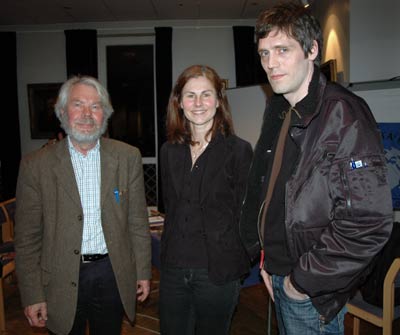 |
| Staffan Lindberg, Gunilla Blomqvist and Petter Larsson at the seminar 29 March 2006. |
• Dr. Gunilla Blomqvist from the Dept.
of Peace and Development Studies (PADRIGU), Göteborg University,
Prof. Staffan Lindberg, SASNET, and the freelance journalist Petter
Larsson, Malmö, participated in a seminar called ”Women
in the export industry in South Asia – Exploitation or Emancipation?” held
on Wednesday 29 March 2006.
The seminar was jointly organised by SASNET and the Association of Foreign
Affairs in Lund, and the venue was Nya Festsalen in the Academic Society
Building (AF), Lund.
Gunilla Blomqvist used findings from her 2004 doctoral dissertation on
”Gender Discourses at Work: Export Industry Workers and Construction
Workers in Chennai, Tamil Nadu, India”. In the Lund seminar
she focused on gender segregation and the situation of women within the
garment export industry in Cehnnai. Her main thesis was that the discrimination
and seclusion of women was reproduced when they entered the labour market
as mostly unskilled or semi-skilled workers. However, coming out of the
home, the work place and collectivity also offered a new opportunites
for changing genedr roles and emancipation.
Based on results from his ongoing research project in rural Tamil Nadu,
Staffan Lindberg then talked about the emancipation of women during the
past 25 years. The main factors in changing gender relations are increased
work outside agriculture, the development of Self Help Groups, and increasing
participation in local politics.
Petter Larsson, finally, discussed issues of g lobalisation and similarities/differences
between the Asian development of today and the European industrialisation
100–150 years ago. An important difference, he pointed out, was
the increasing informalisation of labour and the lack of labour laws
covering small workshops and home based wage labour. In the discussion
it was pointed out that this made it much more different to organise
trade unions and protect labour rights.
The seminar was well attended by Lund university students, many of them
from the Masters programme in Asian studies. More
information on the seminar (as a pdf-file).
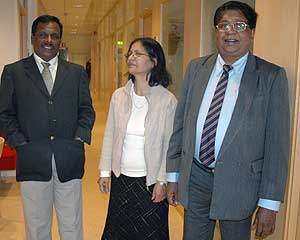 |
| Seminar in Lund Tuesday 18 April 2006. From left to right: Dr. Chandrabose, Alia Ahmad and Sirimevan S. Colombage. |
• SASNET arranged a guest lecture with Prof. Sirimevan S. Colombage and Dr. Chandrabose from the Faculty of Social Sciences, Sri Lanka Open University, on Tuesday 18 April 2006. They lectured about ”The role of microfinance in fighting rural poverty in Sri Lanka”. Prof. Colombage is an eminent economist specialised in macro-economic processes in Sri Lanka, and Dr. Chandrabose is regional economist specialised in the tea plantation economy. Since 2003 they have been engaged in a study of microfinance and rural poverty in Sri Lanka, a research project financed by a Swedish Research Links grant. The project has been carried out in collaboration with Associate Professor Alia Ahmad, Dept. of Economics, Lund University. Venue: Conference Room, Centre for East- and South-East Asian Studies, Scheelevägen 15 D, Alfa 1, Lund.
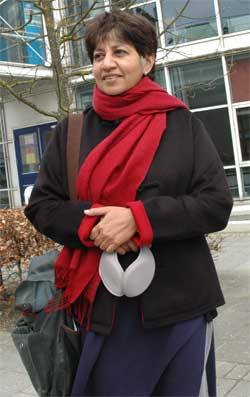 • During
the first week of May 2006 Tejaswini Niranjana, Director for the Centre
for the Study of Culture and Society in Bangalore, India, visited Roskilde
University in Denmark to participate in the PhD Researcher
Training Course on ”Postcolonial sexualities: Politics and
discourses”. Besides heading the well reputed research centre
in Bangalore Dr. Niranjana has for many years studied the Indian Diaspora
in the Carribean, especially Trinidad. In Roskilde she lectured about ”Indian
Nationalisms and the Sexuality Question: History and the Present in
India and Trinidad”. In an open one-day seminar titled ”Situating
Postcolonial Sexualities”, held on Tuesday 2 May 2006, she
also lectured about ”Music, Race and Sexuality in Contemporary
Trinidad”. Staffan Lindberg and Lars Eklund from SASNET
crossed Öresund to listen to her presentation in Roskilde. After
that they went together with Dr. Niranjana to Copenhagen, and had a
fruitful meeting over dinner, discussing possible links to establish
between her institution in Bangalore with Swedish researchers. More
information about the Centre for the Study of Culture and Society.
• During
the first week of May 2006 Tejaswini Niranjana, Director for the Centre
for the Study of Culture and Society in Bangalore, India, visited Roskilde
University in Denmark to participate in the PhD Researcher
Training Course on ”Postcolonial sexualities: Politics and
discourses”. Besides heading the well reputed research centre
in Bangalore Dr. Niranjana has for many years studied the Indian Diaspora
in the Carribean, especially Trinidad. In Roskilde she lectured about ”Indian
Nationalisms and the Sexuality Question: History and the Present in
India and Trinidad”. In an open one-day seminar titled ”Situating
Postcolonial Sexualities”, held on Tuesday 2 May 2006, she
also lectured about ”Music, Race and Sexuality in Contemporary
Trinidad”. Staffan Lindberg and Lars Eklund from SASNET
crossed Öresund to listen to her presentation in Roskilde. After
that they went together with Dr. Niranjana to Copenhagen, and had a
fruitful meeting over dinner, discussing possible links to establish
between her institution in Bangalore with Swedish researchers. More
information about the Centre for the Study of Culture and Society.
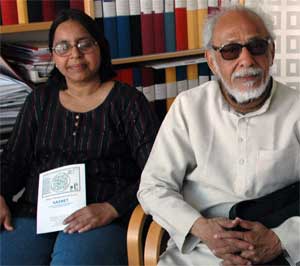 • Kusum
Jain and Geetesh Sharma (photo to the right), journalists,
poets as well as social activists from Kolkata, India, visited SASNET’s
root node office in Lund on Monday 8 May 2006. They have a
long-standing relation to Sweden, being partly involved in the Indo-Swedish
translation project. In 1995 they also published a book titled ”Double
Fantasy” in collaboration with the Swedish writer Tomas
Andersson. The main purpose of their current visit to Sweden is to
participate in a conference with the Green Party of Sweden to be held
in Borås, but they will also among other things visit Indian
associations in Göteborg and Oslo, Norway. Mr. Sharma has recently
published a book titled ”Whither Secularism” (Dialogue
Society 2006), about how a crisis ridden Indian society may overcome
its problems. Ms. Jain is President of the organsiation Women’s
Sahayog, based in Kolkata.
• Kusum
Jain and Geetesh Sharma (photo to the right), journalists,
poets as well as social activists from Kolkata, India, visited SASNET’s
root node office in Lund on Monday 8 May 2006. They have a
long-standing relation to Sweden, being partly involved in the Indo-Swedish
translation project. In 1995 they also published a book titled ”Double
Fantasy” in collaboration with the Swedish writer Tomas
Andersson. The main purpose of their current visit to Sweden is to
participate in a conference with the Green Party of Sweden to be held
in Borås, but they will also among other things visit Indian
associations in Göteborg and Oslo, Norway. Mr. Sharma has recently
published a book titled ”Whither Secularism” (Dialogue
Society 2006), about how a crisis ridden Indian society may overcome
its problems. Ms. Jain is President of the organsiation Women’s
Sahayog, based in Kolkata.
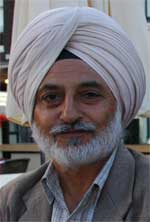 • Prof.
Sucha Singh Gill from the Punjabi University, Patiala, India, held
a SASNET lecture at the Dept. of Sociology, Lund University on
Wednesday 7 June 2006. He lectured about ”Marginalised Peasantry
Seeking Safe Exit in India in the Era of Globalisation”.
Prof. Sucha Singh Gill is professor of Economics at the Punjabi University
and is a leading expert on agriculture and rural development. He has
written extensively on agricultural economics and change, land reforms,
resources mobilisation and farmers movements. In 2001 he authored ”Land
Reforms in India, Vol. 6: Intervention for Capitalist Transformation
in Punjab and Haryana”. During June 2006 he was a guest
researcher at NIAS in Copenhagen and the Department of Sociology, Lund
University. More information.
• Prof.
Sucha Singh Gill from the Punjabi University, Patiala, India, held
a SASNET lecture at the Dept. of Sociology, Lund University on
Wednesday 7 June 2006. He lectured about ”Marginalised Peasantry
Seeking Safe Exit in India in the Era of Globalisation”.
Prof. Sucha Singh Gill is professor of Economics at the Punjabi University
and is a leading expert on agriculture and rural development. He has
written extensively on agricultural economics and change, land reforms,
resources mobilisation and farmers movements. In 2001 he authored ”Land
Reforms in India, Vol. 6: Intervention for Capitalist Transformation
in Punjab and Haryana”. During June 2006 he was a guest
researcher at NIAS in Copenhagen and the Department of Sociology, Lund
University. More information.
• The 19th European Conference on Modern South Asian Studies (ECMSAS)
was successfully held 27–30 June 2006 in Leiden, the Netherlands.
SASNET was also represented at the conference in Leiden. Prof. Staffan
Lindberg, Director of SASNET, chaired panel No. 32 on ”Post Green
Revolution Agrarian Transformation in South Asia: Ecology and Peasant
Life under Globalization”, and he also participated in a panel
discussion on the formation of ANERI, the Academic Network for European
Research related to India, initiated by the European Commission (and
formally launched during the Leiden conference), see below. More
information about the 19th ECMSAS conference in Leiden.
SASNET’s deputy director/webmaster
Lars Eklund also participated in the 2006 conference, visited several
panels and followed the discussions. Lars made a photographic documentation.
See
his photos from the Leiden conference.
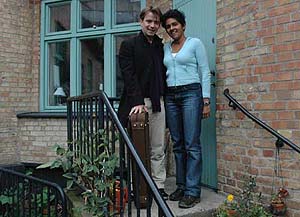 • Sri
Lankan poet Pireeni Sundaralingam and Irish composer/violinist Colm
O’Riain (photo to the right), residing in San Fransisco, USA,
visited Sweden in the end of September to perform with a program
called ”Word and Violin”. SASNET invited them
to Lund to give a well-attended performance on Wednesday 27 September
2006, 19.00. From Lund they proceeded to Uppsala University where they
gave a performance for the Uppsala University English Society on Thursday
28 September. In the program Sundaralingam and O’Riain weave
together music and word in a series of duets exploring the nature of
exile and immigration. More information (as
a pdf-file).
• Sri
Lankan poet Pireeni Sundaralingam and Irish composer/violinist Colm
O’Riain (photo to the right), residing in San Fransisco, USA,
visited Sweden in the end of September to perform with a program
called ”Word and Violin”. SASNET invited them
to Lund to give a well-attended performance on Wednesday 27 September
2006, 19.00. From Lund they proceeded to Uppsala University where they
gave a performance for the Uppsala University English Society on Thursday
28 September. In the program Sundaralingam and O’Riain weave
together music and word in a series of duets exploring the nature of
exile and immigration. More information (as
a pdf-file).
• An Open lecture was held with Dr. Bidyut Mohanty, University of Delhi, India, on 1 November 2006. In the lecture, titled ”One million women grasstroots (village council) leaders: How do they govern the communities?”, Dr. Mohanty talked about the government initiative to integrate women into the political decision making process but also discuss the impact of such a decision on the lives of the villagers in general and that of women in particular. As for example whether the women leaders have engenderd the development process or not. I will also discuss who they are? What are their views about their own capabilities as leaders?’ Dr (Ms) Bidyut Mohanty, an expert on Famine studies has done her Ph.D from the Delhi School of Economics and has been working in the areas of women and rural development through the local government in India since 1994. She has been organizing Women’s Political Empowerment Day Programme annually involving hundreds of elected women representatives from panchayats. She is the series editor of the Proceedings on Women and Political Empowerment from 1995 onwards. She has been giving lectures in different universities of USA and Canada, Thailand and China on women in local government.
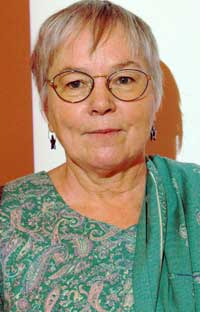 • The
physician Ingrid Eckerman from Stockholm held a SASNET lecture about
the 1984 toxic disaster in Bhopal, in Lund on Wednesday 15 November.
The lecture, organised in collaboration with the Association of Foreign
Affairs in Lund, was titled ”The Bhopal Saga – causes
and consequences of the world’s largest industrial disaster”.
This is also the title of a book she published on Universities Press
(India) in Hyderabad in 2005. In 1994, Dr. Eckerman was a member of
the International Medical Commission on Bhopal, that studied the effects
after the disaster that took place at the Union Carbide factory in
Bhopal in December 1984, the world’s worst industrial accident.
On the night of December 2 1984, while Bhopal slept, 43 tons of methylisocyanate
and other substances leaked from the Union Carbide factory located
in the city. By next morning the place was a graveyard of dead humans
and animals. Of the 520,000 people who were exposed to the gases 8,000
died during the first week and 8,000 later. The impact on the survivors
is visible even today. The pesticide plant from which the gas leaked
was majority owned and controlled by the multinational Union Carbide.
Dr. Eckerman also reviews of most of what has been written about the
incident since 1984, discussing the conflicting stance of the Union
Carbide Corporation and the Governments of India on the moral responsibility
for the tragedy. The lecture was held at Eden, Paradisgatan 5, and
drew an audience of around 30 people, mostly students from different
facultues at Lund University. More
information about Dr. Eckerman’s book.
• The
physician Ingrid Eckerman from Stockholm held a SASNET lecture about
the 1984 toxic disaster in Bhopal, in Lund on Wednesday 15 November.
The lecture, organised in collaboration with the Association of Foreign
Affairs in Lund, was titled ”The Bhopal Saga – causes
and consequences of the world’s largest industrial disaster”.
This is also the title of a book she published on Universities Press
(India) in Hyderabad in 2005. In 1994, Dr. Eckerman was a member of
the International Medical Commission on Bhopal, that studied the effects
after the disaster that took place at the Union Carbide factory in
Bhopal in December 1984, the world’s worst industrial accident.
On the night of December 2 1984, while Bhopal slept, 43 tons of methylisocyanate
and other substances leaked from the Union Carbide factory located
in the city. By next morning the place was a graveyard of dead humans
and animals. Of the 520,000 people who were exposed to the gases 8,000
died during the first week and 8,000 later. The impact on the survivors
is visible even today. The pesticide plant from which the gas leaked
was majority owned and controlled by the multinational Union Carbide.
Dr. Eckerman also reviews of most of what has been written about the
incident since 1984, discussing the conflicting stance of the Union
Carbide Corporation and the Governments of India on the moral responsibility
for the tragedy. The lecture was held at Eden, Paradisgatan 5, and
drew an audience of around 30 people, mostly students from different
facultues at Lund University. More
information about Dr. Eckerman’s book.
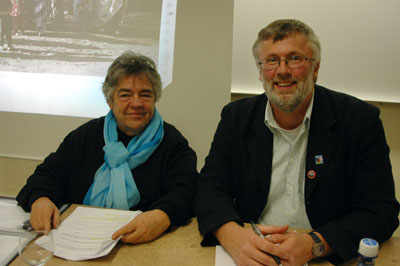 • The
Danish journalist Eva Arnvig held a SASNET lecture about ”Afghanistan:
Warlords, Taliban or who will rule in the future?” in Lund on
Wednesday 29 November 2006, 19.30. The event was organised
in collaboration with the the Association of Foreign Affairs at Lund
University and the Swedish Committee for Afghanistan (SCA) in Lund.
Eva Arnvig is not only an experienced journalist but also a clinical
psychologist. She has worked for 18 years for UN organisationsa such
as UNDP (United Nations Development Programme), and has travelled extensively
in Asia, not the least in Afghanistan. Ms. Arnvig is presently working
with training senior journalists in Asia, but is also engaged in documentary
film productions about the problems in Iraq and Afghanistan.
• The
Danish journalist Eva Arnvig held a SASNET lecture about ”Afghanistan:
Warlords, Taliban or who will rule in the future?” in Lund on
Wednesday 29 November 2006, 19.30. The event was organised
in collaboration with the the Association of Foreign Affairs at Lund
University and the Swedish Committee for Afghanistan (SCA) in Lund.
Eva Arnvig is not only an experienced journalist but also a clinical
psychologist. She has worked for 18 years for UN organisationsa such
as UNDP (United Nations Development Programme), and has travelled extensively
in Asia, not the least in Afghanistan. Ms. Arnvig is presently working
with training senior journalists in Asia, but is also engaged in documentary
film productions about the problems in Iraq and Afghanistan.
In
2002 she received the Media Communications Association (MCA) Gold Award
for the documentary ”Children of Allah”, about everyday life
in the Haqqania madrassah in Pakistan (photo from the film to the
left). In her speech Eva Arnvig presented a grim picture of the
situation in the country today. According to her view, the military occupation
by Nato forces has now turned the clock back to the situation in 1994,
with bad governance, murder and kidnappings. The Taliban rule years were
actually the most peaceful in recent times, and it is therefore no surprise
that the support for the Taliban is widespread even today. A solution
to the crisis in Afghanistan can, Arnvig pointed out, never be won by
weapons, but negotiations are absolutely necessary. Negotiations that
have to include the Taliban. After the lecture, a discussion followed
with Anders Davidson from SCA Lund (photo of Eva and Anders above),
and several people in the audience. Some of them with own first hand
experiences from the Afghanistan-Pakistan region, and also a large number
of Masters students at Lund University, were given an opportunity to
raise questions to Eva Arnvig.
 • Prof.
K. C. Suri from Nagarjuna University in Andhra Pradesh, India, held
a SASNET lecture in Lund on Wednesday 6 December 2006. He
talked about ”The Emergence of coalitional politics in South
Asia, with special reference to India”. Prof. K.C. Suri
is a specialist on Indian and South Asian politics and also on agrarian
economic and political issues. The lecture was organised by SASNET
in collaboration with the Development Studies Seminar at the Dept.
of Sociology. Before coming to Lund, Prof. Suri participated in a conference
on leadership in South Asia at the University of Oslo. He also visited
Stockholm where he met research partners at the International
Institute for Democracy and Electoral Assistance (IDEA), involved
in a research project on ”State of Democracy in South Asia”,
a regional assessment to reflect citizens’ perceptions and experiences
of democracy in the region. A report combining quantitative data (surveys)
along with qualitative data (from case studies, dialogues and expert
assessments) will soon be published. More
information about the SASNET lecture (as a pdf-file).
• Prof.
K. C. Suri from Nagarjuna University in Andhra Pradesh, India, held
a SASNET lecture in Lund on Wednesday 6 December 2006. He
talked about ”The Emergence of coalitional politics in South
Asia, with special reference to India”. Prof. K.C. Suri
is a specialist on Indian and South Asian politics and also on agrarian
economic and political issues. The lecture was organised by SASNET
in collaboration with the Development Studies Seminar at the Dept.
of Sociology. Before coming to Lund, Prof. Suri participated in a conference
on leadership in South Asia at the University of Oslo. He also visited
Stockholm where he met research partners at the International
Institute for Democracy and Electoral Assistance (IDEA), involved
in a research project on ”State of Democracy in South Asia”,
a regional assessment to reflect citizens’ perceptions and experiences
of democracy in the region. A report combining quantitative data (surveys)
along with qualitative data (from case studies, dialogues and expert
assessments) will soon be published. More
information about the SASNET lecture (as a pdf-file).
SASNET - Swedish South Asian Studies Network/Lund
University
Address: Scheelevägen 15 D, SE-223 70 Lund, Sweden
Phone: +46 46 222 73 40
Webmaster: Lars Eklund
Last updated
2007-04-12
